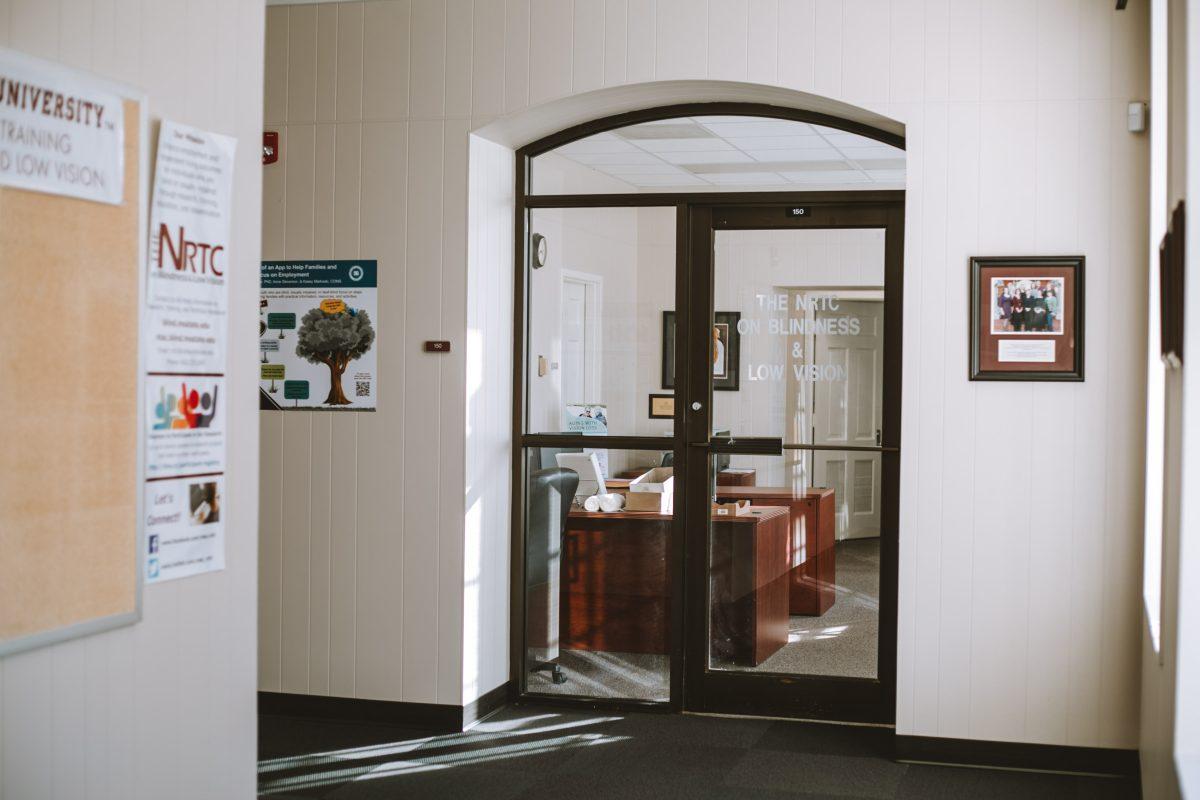For 41 years, the National Research and Training Center on Blindness and Low Vision (NRTC) has helped improve employment and independent living outcomes for individuals with blindness and low vision across the country.
The NRTC, housed in the Industrial Education Building at Mississippi State University, has focused on research, training and technical assistance toward affected individuals and professionals.
The center assisted professionals and employers who may work with these individuals in the future.
NRTC is the only low-vision center funded by the United States Department of Health and Human Services in the nation.
Most of its funding originates from the National Institute on Disability, Independent Living and Rehabilitation Research, the federal government’s main disability research agency, for a Rehabilitation Research and Training Center Program (RRTC) grant.
The RRTC grant is awarded on a five-year cycle and is aimed at conducting research and training activities in specific topic areas assigned by the national institute.
Anne Steverson, a research associate for the center, has been with the NRTC since October 2013. She said the center has a history of receiving this funding from the institute.
“We have competed for that grant since 1981 and have won it every year it has been competed,” Steverson said. “We also have other grants and funding sources with states, such as state evaluations for its older blind programming.”
The center also receives funding for various federal projects, including the Older Individuals who are Blind Training and Technical Assistance Center (OIB-TAC) through a grant from the Rehabilitation Services Administration.
With assistance center, the NRTC has worked with program managers in all 50 states and most territories to train its staff on best practices for working with visually impaired employees on a basic level.
The grant also requires the NRTC to collaborate with three other states more intensely, and the center has already collaborated with 15.
Cantrice Moffitt, the center’s rehabilitation training and outreach specialist, said the atmosphere when applying for these grants is remarkable.
“It was a collaborative effort across the whole team to get things done,” Moffitt said. “It (felt) like an achievement for all of us … no matter what our roles where in (the NRTC).”
The NRTC primarily focuses on research and training to further employment opportunities for blind and low-visioned individuals.
In 2020, the center received a NIDILRR grant to establish a research and training program on the “employment of people who are blind or have low vision.”
The project will encompass seven research projects aimed “to generate new knowledge and provide training and technical assistance with the goal of improving employment outcomes for people who are blind or have low vision,” according to the NRTC website.
On one particular project, Steverson said the NRTC will evaluate whether a virtual interview software system is works for individuals who are blind or have low vision.
The evaluation of an interactive video aimed at employers serves as the third project for the center.
Sarah Moody, the center’s communications coordinator, has worked on creating the video for the project. She said its creation aims to help employers and increase awareness for disabled individuals entering the workforce.
“This interactive video is information that provides almost every single answer you can imagine possible,” Moody said. “It allows employers to work through different aspects of the video and makes it more relatable for these businesses.”
Steverson said the interactive video project will look at implicit bias and biofeedback.
“The main targets are hiring resource managers, so we are working with the College of Business to pilot some of the videos on its students,” Steverson said.
Another project will train adults for virtual job searching skills. It features a similar curriculum to a previous year’s study that trained teenagers.
Moffitt said her main takeaway from the skills training is how individuals learn new skills and connect with others.
“It provides training on interviewing skills, resume writing and networking. They are (able to) use their own knowledge and experiences (and) bring them to the table to help each other,” Moffitt said.
The NRTC conducted a one-year study examining the accessibility of online job application forms. The project collaborated with the American Foundation for the Blind.
In addition to the research projects, the center also has 15 training and technical assistance projects.
Moffitt shared an example of one of these projects.
“One of them is the Blindness Experience Training. We are developing that for Vocational Rehabilitation Agencies so those workers … can experience and overcome simple obstacles that visually impaired individuals deal with.”
Moffitt said the training exercises will simulate complications like cataracts or diabetic retinopathy and have participants try to do everyday activities.
NRTC also hosts webinars, teaching disability employment topics, and records podcasts, where visually impaired individuals share their employment experiences.
Moody shared the impacts of the podcasts.
“It’s just different perspectives and has that education aspect. It is also personable to individuals who are blind or have low vision to give them inspiration,” Moody said.
Alongside the research and training projects, the NRTC also provides 65 free continuing-education courses for individuals who are in the blindness and low vision field. The courses provide accreditation for individuals to retain their licenses or are new to the field.
The center provides an opportunity for visually impaired individuals to emerge in the workforce. Moody said that through her experience, she realized how impactful her role can be.
“At our OIB conference at Denver, a few of our managers needed human guides. I got to human guide one of our program managers,” Moody said. “Getting to live that experience with someone just made what we do really impactful.”
MSU center provides assistance for visually impaired individuals
The Industrial Education Building on campus houses the National Research and Training Center on Blindness and Low Vision.
About the Contributor

Trey Barrett, Former Life & Entertainment Editor
Trey Barrett served as the Life & Entertainment Editor from 2022 to 2023.
0
Donate to The Reflector
Your donation will support the student journalists of Mississippi State University. Your contribution will allow us to purchase equipment and cover our annual website hosting costs.
More to Discover













